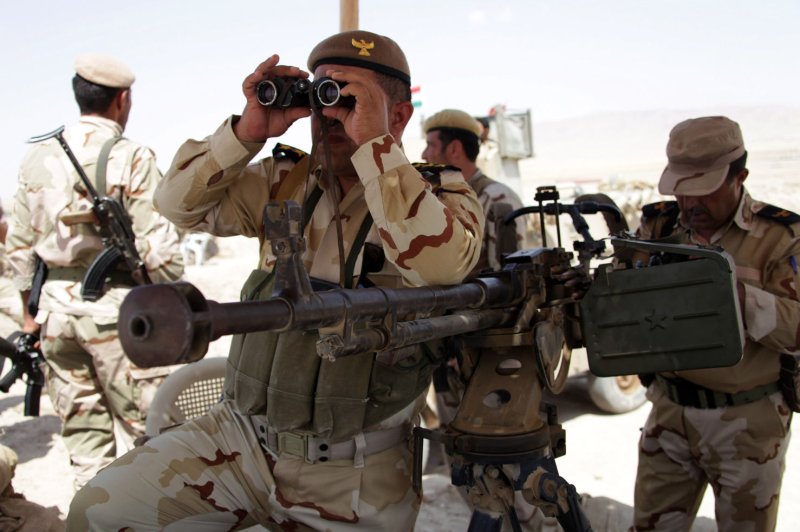Kurdish Peshmerga soldiers keep watch from their post in Makhmur town, after they took control of the town from Islamic State militants, northwest of Erbil, Kurdistan region, Iraq, August 28, 2014. (UPI/Mohammed al Jumaily) |
License Photo
NEW YORK, Sept. 2 (UPI) -- Amnesty International published a new report Tuesday titled "Ethnic Cleansing on a Historic Scale: The Islamic State's systematic targeting of minorities in northern Iraq."
The report, Amnesty says, "presents a series of hair-raising accounts from survivors of massacres" in the Sinjar region during the month of August.
"The group that calls itself the Islamic State (IS) has carried out ethnic cleansing on a historic scale in northern Iraq. IS has systematically targeted non-Arab and non-Sunni Muslim communities, killing or abducting hundreds, possibly thousands, and forcing more than 830,000 others to flee the areas it has captured since 10 June 2014. Ethnic and religious minorities have lived together in the Nineveh province; today, only those who were unable to flee remain trapped there, under threat of death if they do not convert to Islam."
Hundreds of Iraqis were reportedly killed during two of the deadliest assaults on the village of Qiniyeh on August 3 and the village of Kocho on August 15. "The number of those killed in these villages alone runs into the hundred. Groups of men and boys including children as young as 12 from both villages were seized by IS militants, taken away and shot."
In addition to those massacred, many others were abducted. The overwhelming majority of the abducted are Yazidi residents of the Sinjar region and "have in some cases devastated entire Yezidi families."
Amnesty discovered a "pattern emerging... most of the abductions -- like most of the killings -- took place on or since 3 August in and around the towns and villages south of Mount Sinjar, where armed clashes took place between IS fighters advancing on the Sinjar region from the south and armed residents trying to repel the IS advance."
The United Nations has also expressed concern about IS "systematically targeting men, women and children based on their ethnic, religious or sectarian affiliation," with U.N. High Commissioner for Human Rights Navi Pillay labeling the campaign against Christians, Yazidis and Turkmen an "ethnic and religious cleansing."
An estimated 1.2 million Iraqis are refugees, with many seeking asylum in other countries.















